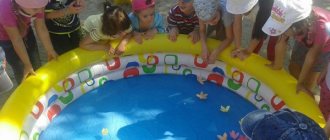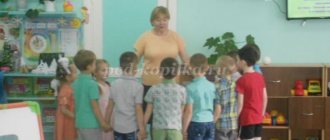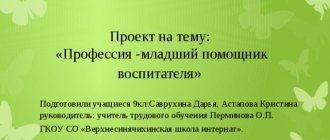Methodological techniques for introducing adults to work in the older group
In the senior group, work continues to familiarize preschoolers with the work of adults, to develop in them an emotionally positive attitude towards the working person, which was started in the junior and middle groups. As a result, children’s ideas deepen and the existing positive attitude towards workers is consolidated. Working with older preschoolers on the topics: “About the work of builders”, “About those who made cars”, “About the work of collective farmers”, “How our mothers and fathers work”, “About the work of doctors and nurses”, the teacher tries to introduce children with specific people working at nearby enterprises, to ensure that children form a generalized image of a hard worker.
Literature and the visual arts play an important role in developing an emotionally positive attitude towards work and respect for working people in preschoolers. In the older group, children are especially active in perceiving works of art about working people. Most of all, they are concerned about the heroic work of adults. The images of doctors, pilots, astronauts, fishermen, whose work is often associated with danger to life, evoke in children a sense of pride in brave, courageous people, sympathy for them if they find themselves in trouble, and a desire to imitate them. It is important to convey to children that selfless, conscientious work makes a simple, modest person a hero; people need him. Being needed by people is happiness.
In conversations held after reading works, children’s attention is drawn not only to the main character, but also to the fact that his activities largely depend on the activities of the secondary characters in the stories. To do this, ask the following questions: “Do you think doctors could save patients if other people did not help them? Tell us about it. Did you need help from other people? What was it? (I. Vinokurov “Through the Storm”, I. Turchin “The Man Got Sick”). Mostly, children answer these questions correctly, but at the end of the conversation, summing up the answer, the teacher emphasizes the importance of moral support from one person to another, giving examples from the text.
Thus, in the senior group of the kindergarten, work continues to familiarize adults with the work and cultivate a positive attitude towards the worker. At the same time, the first place is given to the realization that conscientious work makes a person a hero.
Conclusion
At all times and at all stages of the development of society, the main concern of all peoples has been education through work, since outside of work there is neither aesthetic, nor moral, nor physical, nor full mental development.
Labor as a human activity is given much attention in folk pedagogy. This is evidenced by numerous proverbs and sayings: “Patience and labor will grind everything out”, “Labor feeds a person, but laziness spoils”, “He who does not work, does not eat”, “Without labor you cannot pull a fish out of the pond”, “Without labor there is no good”, etc.
For many centuries, the issue of cultivating hard work has attracted the attention of prominent foreigners (Ya.; A. Comenius, J. Locke, J.; J. Rousseau, I.; G. Pestalozzi, F. Froebel, P. Kergomar, O. Decroli and etc.) and domestic (K.D. Ushinsky, L.N. Tolstoy, E.N. Vodovozova, P.P. Blonsky, P.F. Kapterev, K.N. Ventzel, L.K. Shleger, S. T. Shatsky, N.K. Krupskaya, A.S. Makarenko, V.A. Sukhomlinsky and others) scientists and teachers.
The advent of the 21st century, a century of new socio-economic and political guidelines for the country, has brought to life an urgent need to educate a hardworking individual striving for self-determination and self-realization. Only such a person can be considered competitive, only such a person can lay claim to future success both in work and in life in general.
The current legislative framework emphasizes the high status of hard work as a personal quality. The Law of the Russian Federation “On Education” enshrines one of the fundamental principles of state educational policy: “The humanistic nature of education, the priority of universal human values, human life and health, and the free development of the individual. Education of citizenship, hard work, respect for human rights and freedoms, love for the surrounding nature, Motherland, family.”
One of the leading means of labor education for preschoolers is to familiarize them with the labor of adults. The forms of familiarizing children with the work of adults and cultivating an emotionally positive attitude towards workers can be varied. These include excursions to the place of work of adults, meetings and conversations, inviting an adult to a kindergarten to watch how children work in order to teach them something, participation in labor holidays, preparing gifts, games, reading, subsequent analysis of works of art, fine art activities, joint activities of children and adults, etc. Such forms of work help to form in preschoolers the correct ideas about a working person who is an example to follow .
In conclusion, we note that, no matter what form of familiarization of preschool children with the work of adults the teacher chooses, what is the main motive that encourages children to work, as shown by Ya.Z. Neverovich, T.A. Markova, is their desire to help adults.



